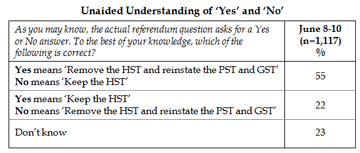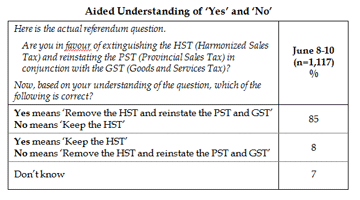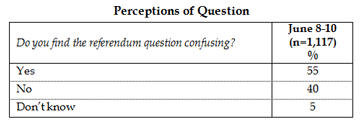Update on BC HST Referendum
Referendum Preference
Currently, 44% of British Columbians say they expect to vote to `remove the HST and reinstate the PST and GST'. This is a 6 point lead over the 38% who say they expect to vote to `keep the HST'. Eighteen percent are undecided or say they will not vote in the referendum. On a decided basis (i.e. excluding undecided/will not vote), this translates into 54% for removing the HST and 46% for keeping the HST.
The current result is best compared to our May 9-13 poll which was taken a few weeks before the provincial government announced changes to the HST, including a tax reduction. This comparison shows an 8 point decline in the percentage of British Columbians who plan to vote to scrap the HST (from 52% to 44%). This decline is countered by a 2 point increase in voters wanting to keep the HST (from 36% to 38%) and a 6 point increase in voters who are undecided or will not vote (from 12% to 18%).
A comparison to our May 26-27 poll would not be apples-to-apples because all respondents in the May 26-27 poll were informed of the changes the provincial government had just announced to the HST. The purpose of the May 26-27 poll was to measure the potential impact of the changes. The only way to do that was to inform respondents about the changes, which makes them different from the general public who likely have far less than universal awareness of the changes.
Support for the HST continues to be divided along gender lines. Men slightly favour keeping the HST (47% keep vs. 41% scrap) while women favour scrapping the tax (47% scrap vs. 30% keep). Many women, however, are still undecided or will not vote (23% of women vs. 12% of men).
In the Lower Mainland, there is almost equal support for scrapping the tax (42%) and keeping the tax (40%). Outside the Lower Mainland, the scrap the tax sentiment (47%) leads by a substantial margin over the keep the tax sentiment (35%).
A majority of 2009 BC Liberal voters (61%) say they will vote to keep the HST, while one-quarter (27%) will vote to scrap the tax. Among 2009 NDP voters, two-in-ten (19%) say they will vote to keep the HST, while six-in-ten (63%) will vote to scrap it.
Unaided Understanding of `Yes' and `No'
Before they were shown the actual referendum question, survey respondents were asked for their top-of-mind understanding of what a `Yes' and `No' vote means. It appears there is some opportunity for voter confusion as more than two-in-ten (22%) residents incorrectly said that a `Yes' vote means keeping the HST and a `No' vote means removing the HST. A slight majority (55%) of residents correctly identified the meaning of `Yes' and `No', while one-quarter (23%) were unsure.
Among those who earlier said they will vote to `keep the HST', more than one-quarter (27%) gave the wrong response (54% correct, 19% don't know). Among those who earlier said they will vote to `scrap the HST', 16% gave the wrong response (65% correct, 19% don't know).
Aided Understanding of `Yes' and `No'
Once shown the actual referendum question, most respondents (85%) correctly interpreted `Yes' as meaning remove the HST and `No' as meaning keep the HST. However, nearly one-in-ten (8%) misinterpreted `Yes' and `No' even after seeing the actual question and a further 7% said they did not know how to interpret the question.
Again, those who earlier said they will vote to `keep the HST' were more likely to misinterpret the question (12% gave wrong answer) than those who said they will vote to `scrap the HST' (5% gave wrong answer).
Perceptions of Question
A slight majority (55%) of British Columbians say they find the referendum question confusing.
Interestingly, of those who say the question is confusing, only 6% gave the wrong answer in the previous question (aided understanding). This is less than the 10% wrong answers from those who said the question is not confusing.
These are the findings of an online Ipsos Reid poll of 1,117 adult British Columbians conducted using Ipsos Reid's online household panel between June 8 and 10, 2011. A survey with an unweighted probability sample of this size and a 100% response rate would have an estimated margin of error of 1773.0 percentage points, 19 times out of 20. The margin of error would be larger within regions and for other sub-groupings of the survey population. These data were statistically weighted to ensure the sample's regional and age/sex composition reflects that of the actual BC population according to 2006 Census data.
For more information on this news release, please contact:
Kyle Braid
Vice-President
Ipsos Reid Public Affairs
778-373-5130
[email protected]
About Ipsos Reid
Ipsos Reid is Canada's market intelligence leader, the country's leading provider of public opinion research, and research partner for loyalty and forecasting and modelling insights. With operations in eight cities, Ipsos Reid employs more than 600 research professionals and support staff in Canada. The company has the biggest network of telephone call centres in the country, as well as the largest pre-recruited household and online panels. Ipsos Reid's marketing research and public affairs practices offer the premier suite of research vehicles in Canada, all of which provide clients with actionable and relevant information. Staffed with seasoned research consultants with extensive industry-specific backgrounds, Ipsos Reid offers syndicated information or custom solutions across key sectors of the Canadian economy, including consumer packaged goods, financial services, automotive, retail, and technology & telecommunications. Ipsos Reid is an Ipsos company, a leading global survey-based market research group.
To learn more, please visit www.ipsos.ca.
About Ipsos
Ipsos is a leading global survey-based market research company, owned and managed by research professionals. Ipsos helps interpret, simulate, and anticipate the needs and responses of consumers, customers, and citizens around the world.
Member companies assess market potential and interpret market trends. They develop and build brands. They help clients build long-term relationships with their customers. They test advertising and study audience responses to various media. They measure public opinion around the globe. Ipsos member companies offer expertise in advertising, customer loyalty, marketing, media, and public affairs research, as well as forecasting, modeling, and consulting. Ipsos has a full line of custom, syndicated, omnibus, panel, and online research products and services, guided by industry experts and bolstered by advanced analytics and methodologies. The company was founded in 1975 and has been publicly traded since 1999. In 2010, Ipsos generated global revenues of e1.140 billion ($1.6 billion U.S.).
Visit www.ipsos-na.com to learn more about Ipsos offerings and capabilities.
Ipsos, listed on the Eurolist of Euronext - Comp B, is part of SBF 120 and the Mid-100 Index, adheres to the Next Prime segment and is eligible to the Deferred Settlement System. Isin FR0000073298, Reuters ISOS.PA, Bloomberg IPS:FP







